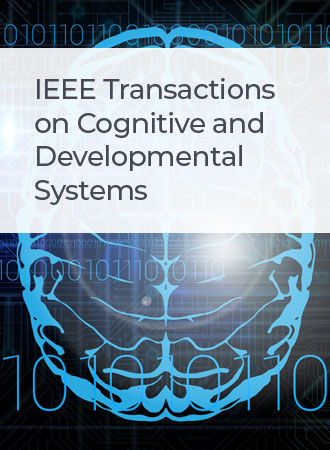EEG-Based Auditory Attention Detection With Spiking Graph Convolutional Network
IF 5
3区 计算机科学
Q1 COMPUTER SCIENCE, ARTIFICIAL INTELLIGENCE
IEEE Transactions on Cognitive and Developmental Systems
Pub Date : 2024-03-12
DOI:10.1109/TCDS.2024.3376433
引用次数: 0
Abstract
Decoding auditory attention from brain activities, such as electroencephalography (EEG), sheds light on solving the machine cocktail party problem. However, effective representation of EEG signals remains a challenge. One of the reasons is that the current feature extraction techniques have not fully exploited the spatial information along the EEG signals. EEG signals reflect the collective dynamics of brain activities across different regions. The intricate interactions among these channels, rather than individual EEG channels alone, reflect the distinctive features of brain activities. In this study, we propose a spiking graph convolutional network (SGCN), which captures the spatial features of multichannel EEG in a biologically plausible manner. Comprehensive experiments were conducted on two publicly available datasets. Results demonstrate that the proposed SGCN achieves competitive auditory attention detection (AAD) performance in low-latency and low-density EEG settings. As it features low power consumption, the SGCN has the potential for practical implementation in intelligent hearing aids and other brain–computer interfaces (BCIs).利用尖峰图卷积网络进行基于脑电图的听觉注意力检测
从脑电图(EEG)等大脑活动中解码听觉注意力,有助于解决机器鸡尾酒会问题。然而,脑电信号的有效表示仍然是一项挑战。原因之一是目前的特征提取技术没有充分利用脑电信号的空间信息。脑电信号反映了不同区域大脑活动的集体动态。这些信道之间错综复杂的相互作用,而不是单个脑电图信道,反映了大脑活动的显著特征。在本研究中,我们提出了一种尖峰图卷积网络(SGCN),它能以一种生物学上合理的方式捕捉多通道脑电图的空间特征。我们在两个公开数据集上进行了综合实验。结果表明,所提出的 SGCN 在低延迟和低密度脑电图设置下实现了具有竞争力的听觉注意力检测(AAD)性能。由于 SGCN 功耗低,因此有望在智能助听器和其他脑机接口(BCI)中得到实际应用。
本文章由计算机程序翻译,如有差异,请以英文原文为准。
求助全文
约1分钟内获得全文
求助全文
来源期刊

IEEE Transactions on Cognitive and Developmental Systems
Computer Science-Software
CiteScore
7.20
自引率
10.00%
发文量
170
期刊介绍:
The IEEE Transactions on Cognitive and Developmental Systems (TCDS) focuses on advances in the study of development and cognition in natural (humans, animals) and artificial (robots, agents) systems. It welcomes contributions from multiple related disciplines including cognitive systems, cognitive robotics, developmental and epigenetic robotics, autonomous and evolutionary robotics, social structures, multi-agent and artificial life systems, computational neuroscience, and developmental psychology. Articles on theoretical, computational, application-oriented, and experimental studies as well as reviews in these areas are considered.
 求助内容:
求助内容: 应助结果提醒方式:
应助结果提醒方式:


